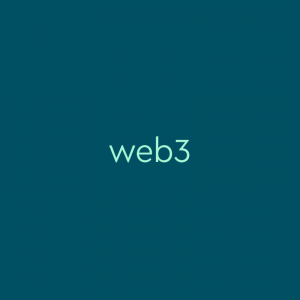Tech & Science dictionary
web3
or Web 3.0 [ web three ]
Web3 is a term sometimes used to refer to the stage of the internet that is anticipated to (or that is thought to have already begun to) follow the stage that’s popularly referred to as Web 2.0. What Web3 entails or will entail is debated, but it is generally associated with (and thought to be based on a foundation of) more decentralized technologies, especially cryptocurrency and blockchains.
Some people view the term Web3 as simply a new way of referring to such technologies collectively (perhaps as a way of “rebranding” them).
The term Web3 is often used to distinguish such things from Web 2.0, the name for the “second generation” of the internet (its current form), which is characterized in part by the dominance of social media and corporate-owned platforms and sites, such as Google, Facebook, and Amazon. (The term Web 3.0 is sometimes used to mean the same thing as Web3.)
In contrast, Web3 is often described or envisioned as providing new avenues of interaction, content, and commerce that circumvent or replace traditional models, which largely rely on corporate or government control.
For example, blockchain technology is often touted by its proponents as a way for users to manage their own groups, data, and transactions without the need for outside regulation.
Though some existing technologies and platforms are considered by some to constitute a part of Web3, many anticipated elements of Web3 are still theoretical, requiring advances in artificial intelligence or virtual reality, for example.
Discussion of Web3 as a current reality, inevitability, or business opportunity is often met with the same criticism and skepticism levied against some of the technologies associated with it. For example, criticisms of cryptocurrencies and NFTs include that they lack utility; that they are marketing schemes or outright scams; or that they have adverse environmental impacts (namely the high amount of energy required for maintaining them digitally).
Where does web3 come from?

The term Web3 and the concept it refers to is often traced to an April 2014 blog post by Ethereum cofounder Gavin Wood, who used the term Web 3.0 to refer to his vision of a future decentralized internet in which all sensitive data was private and encrypted. In 2017, Wood cofounded the Web3 Foundation, an organization that further popularized the idea and the term Web3. (The term Web 3.0 was used earlier in a different way to refer to what has since been called the semantic Web.)
The term Web3 gained much wider awareness in 2021 and 2022 as a result of media coverage of it as a major point of discussion in the tech industry.
Examples of web3
Who uses web3?
The term Web3 is used and interpreted in different ways. It’s closely associated with decentralized technologies, especially cryptocurrencies and blockchains, which are often thought to constitute its foundation. Some people view the term Web3 as simply a new way of referring to such technologies collectively.
Looking for a graphic designer for a web3 project.
— Joeskiee (@JoeskieeM) March 27, 2022
If your goal is to fight poverty, Web3 technologies are a very exciting development.
— Andrew Yang🧢⬆️🇺🇸 (@AndrewYang) February 12, 2022
the thing about Web3 is that it is uniquely useless. I have actively searched for an explanation as to why it's the future, what products it would allow us to build, what sort of *good* it would provide, and I cannot even at my most optimistic find a real use case
— Ed Zitron (@edzitron) February 21, 2022
Note
This is not meant to be a formal definition of web3 like most terms we define on Dictionary.com, but is rather an informal word summary that hopefully touches upon the key aspects of the meaning and usage of web3 that will help our users expand their word mastery.